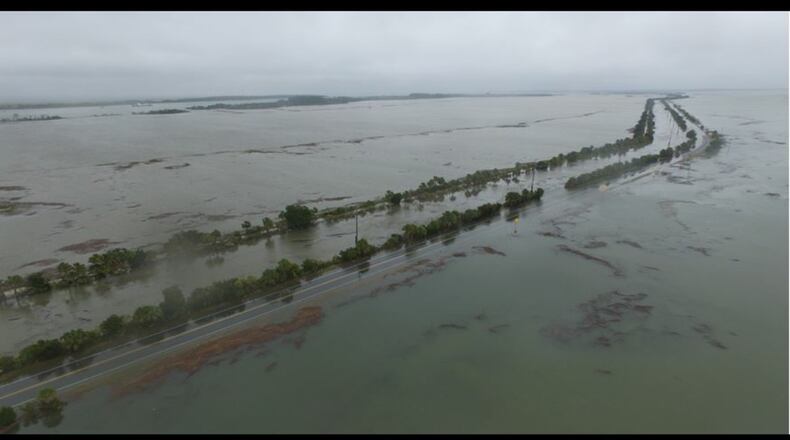Slowly, carefully, Republicans in Georgia are shifting on the topic of climate change, taking care not to offend the fellow in the White House — the one who has claimed it's a Chinese hoax.
U.S. Rep. Buddy Carter, a Republican whose congressional district encompasses the 100-mile Georgia coast, is only one of those in transition.
Last month, Carter was appointed to a select congressional committee on global warming – and in the process, confessed that “climate change is real and the need to protect our environment is real.” The problem, he said, is how to address the situation without killing the U.S. economy.
Last week, Carter again made news. The Savannah area congressman maintains that he remains a “drill, baby, drill” Republican, but he penned a letter to the acting secretary of the interior, asking that his state be excluded from Trump administration plans to allow for the exploration of oil off the Atlantic coast.
Carter explained that he had undergone no change in philosophy. He had not succumbed to any desire to wean the earth away from fossil fuels. Rather, Carter pointed to a resolution passed by the state House in Atlanta one day earlier, opposing offshore drilling.
“The federal government should respect the people of Georgia to make this critical decision for themselves,” Carter wrote.
House Resolution 48 was a strange creature on several counts. Its objections to offshore drilling made no mention of rising sea levels or increased carbon dioxide levels, but focused on the hazards that oil spills and leaks would pose to a fishing and tourism industry that generates 21,000 jobs along the shore.
Migrating right whales and non-migrating nuclear submarines docking at King’s Bay would be endangered, the resolution said.
Another sign that Republicans are still a work in progress when it comes to environmental matters: The first signer of the bill was state Rep. Carl Gillard, a Democrat from Garden City.
The other five sponsors listed were Republican, none of whom could be characterized as climate change revolutionaries. One of the GOP signers on HR 48 was state Rep. Don Hogan of St. Simon’s Island — who had also authored a separate bill to loosen restrictions on beachside development.
Hogan was asked in a Senate committee whether this was wise, given rising sea levels. "There's a lot of controversy about the sea level rising," Hogan replied. "That's a controversy within itself. But I've not noticed it in 52 years living by it."
None of HR 48’s authors were willing to be seen with their legislation when it came before the House natural resources committee on March 21. It passed out anyway.
But after the committee vote, Chairman Lynn Smith, R-Newnan, had this to say: “Will all of you please tell the signers of this bill that they owe us — big time.”
The resolution to oppose oil exploration off the Georgia coast passed the entire House on the last day of the 2019 session, on a 125-36 vote. Every “no” vote was cast by a Republican. Nineteen lawmakers were excused from voting, or simply did not vote. Most of those were Republican, too. In other words, the House Republican caucus was split neatly in half by the issue.
But if the Republican party is to avoid a drubbing in 2020, nationally and in Georgia, it must find topics that can attract independents and resonate with white, college-educated women who are disillusioned with Trump.
Regardless of the president's position, climate change might be one of those issues. And so we have an organization calling itself Conservatives for Clean Energy, a loose collection of political consultants in 20 states. GOP consultant Steve Butler is one of those involved in the Georgia operation, anticipated to crank up later this month.
The group’s objective is to provide 2020 Republicans with the language needed to talk about energy alternatives to fossil fuels — solar especially, but also wind, biomass and nuclear. “We’re not liberals, we don’t believe in subsidies — we actually believe in free market solutions, Butler said.
The one requirement necessary for a Republican to survive a conversation on climate change is the ability to utter the same words that Buddy Carter used: “Climate change is real.”
In fact, Butler said, the group — he wouldn’t talk about what parties might be bankrolling it — has its origins in last November’s release of a federal scientific report on global warming that said the phenomenon was real, human-induced and potentially catastrophic.
“I don’t believe it,” President Trump said in response.
Conservatives for Clean Energy already has some Georgia polling in hand, to help GOP candidates test messages. The survey, completed in March, indicated that support for nuclear power is on the bubble, with Republicans and independents favoring the construction of two new nuclear reactors at Plant Vogtle, and Democrats torn.
Older white men drive support for Plant Vogtle’s expansion, while younger white women are among its most concentrated opponents.
Solar energy appears to be the big winner. More than 90 percent said it was important to protect the right of property owners to lease their land for renewable energy production — which in Georgia means solar farms. Georgia has already made progress on that front, via the state Public Service Commission – which could give Republicans an immediate bragging point.
Butler said he’s already made appointments to discuss environmental messaging with Carter, U.S. Rep. Drew Ferguson, R-West Point, and Karen Handel, who is out to retake the Sixth District congressional seat in north metro Atlanta.
State Agriculture Commissioner Gary Black is on board, too, Butler said. The devastation caused by a Hurricane Michael that charged out of an overheated Gulf of Mexico may be a factor.
“You’ve got to think 20 or 30 years down the line if you’re in farming,” Butler said. “Agriculture people — they’re the easiest to turn around on this issue.”
About the Author
The Latest
Featured



